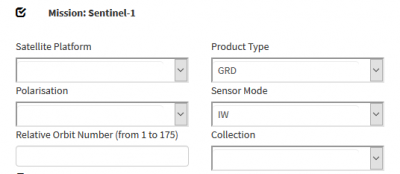SAR flood mapping with SNAP
(→Radiometric anfd geometric calibration) |
(→Data transfer) |
||
| Line 2: | Line 2: | ||
=Data transfer= | =Data transfer= | ||
Download example tutorial data from Nigeria or data from your personal region of interest: two Sentinel-1 scenes one pre-event acquisition date and one post-event date: [[Downloading Sentinel-2 images]]. | Download example tutorial data from Nigeria or data from your personal region of interest: two Sentinel-1 scenes one pre-event acquisition date and one post-event date: [[Downloading Sentinel-2 images]]. | ||
| − | + | Select Product type '''GRD''' with '''VV''' polarization. | |
| + | [[File:esa_openhub_S1.png|400px]] | ||
| + | |||
=Subsetting= | =Subsetting= | ||
Open SNAP Desktop. | Open SNAP Desktop. | ||
Revision as of 16:40, 3 December 2019
In this tutorial we will use Level-1 Ground Range Detected (GRD) Sentinel-1 data downloaded from the Copernicus Open Access Hub. The example data is from a study area in Nigeria near the city of Lokoja in Kogi province near the junction of the two large rivers Niger and Benue. During the westafrican monsoon April - September heavy rainfall and floods occur.
Contents |
Data transfer
Download example tutorial data from Nigeria or data from your personal region of interest: two Sentinel-1 scenes one pre-event acquisition date and one post-event date: Downloading Sentinel-2 images.
Select Product type GRD with VV polarization.

Subsetting
Open SNAP Desktop. Drag and drop the zip files of the Sentinel-2 scenes into the TOC. We need to reduce the amount data by subsetting the large Sentinel-1 scenes.